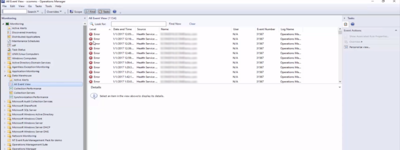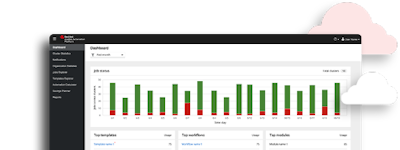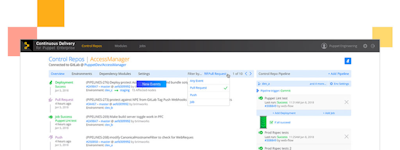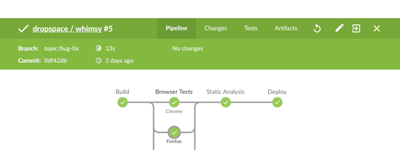17 years helping Singaporean businesses
choose better software
Ansible Automation Platform
What Is Ansible Automation Platform?
Red Hat® Ansible® Automation Platform is a foundation for building and operating automation across an organization. The platform includes all the tools needed to implement enterprise-wide automation.
Who Uses Ansible Automation Platform?
Not provided by vendor
Not sure about Ansible Automation Platform?
Compare with a popular alternative

Ansible Automation Platform
Reviews of Ansible Automation Platform

Alternatives Considered:
One of the best tools to transition I.T. Teams to DevOps
Comments: Ansible by itself can be challenging for Microsoft shops used to GUIs but the Automation Platform resolves this. I have worked with clients and reduced processes from days to minutes which can be done with scripting but the best part about Ansible Automation Platform is that you can hand off the automated workflow to the I.T. team with full understanding on how to run and monitor the playbooks.
Pros:
- The GUI in this product makes it very simple for I.T. teams looking to adopt DevOps since it reduces the learning curve on learning ansible from the shell. Specially Microsoft shops that are used to GUIs. - One of my favorite features is that ansible is agentless unlike other tools like Chef or SCCM and the reason for this is that Ansible pushes config and doesn't need to rely on the client having the agent installed, checking back for new configs (like GPOs) or having to update the agent. - The platform allows for governance of the collections to use and comes with RHEL certified collections installed for third party integrations so you know you are using vetted modules. - I like to see the report on the most used modules so I know and can compare with the team's tickets and workload so you can also go in the galaxy and see if there are other complementing or better collections. - Role based access and wizard like playbooks helps to add even non-admins and less experienced users since they can only get access to specific playbooks that simply ask questions and the platform passes the answers to the playbooks. - The API makes it easy to integrate with other products like ServiceNow or Azure DevOps by passing values and triggering each other. - The VSCode extension is great to write playbooks with hints and auto corrections
Cons:
The support for Windows has improved over the years and I have been able to even transition clients to use Ansible for most of their windows tasks but for Microsoft shops is harder to adapt. Maybe more webinars and comparisons on how Ansible complements Powershell DSC or is a better platform than SCCM or other config managers.
Alternatives Considered:
Easy to use configuration management and automation solution for complete administrative scope
Comments: It's easy to use and comprehend on the code/configuration development side, interfaces well with SCMs and with specific infrastructure tools/solutions. Idempotency oriented approach allows describing expected status that the tool then attempts be set/reached.
Pros:
Easy to use, yaml expected status oriented coding approach, using basic SSH and similar underlying communication protocols/tools, basically requires only python on targets, highly expandable through plugins and community collections.
Cons:
Requires heavy python installation on each target (which can also introduce vulnerabilities), expects passwordless connection be possible between server or control node and targets, for more administrative tasks systems/targets need to be setup with correct permissions a priori.
Creation of rk8s cluster with longhorn on vCloud platform
Comments: We use Ansible for the delivery of clusters rk8s with longhorn on vCloud platform whith the use of yaml files. at first we take many time to create the script and conf files, about 20 days with no code experience, but when all file was ready we create all the kubernetes enviroment on 2 hours. very good thing.
Pros:
Great range of plugin for all cases on IT tasks, more easy than other automation tools when you master it
Cons:
need a mid/base experience of coding or read many pages of documentations for make a functional automation task
The best configuration management tool
Comments: It's a great software with so many features like roles, vault, playbook, inventory etc. So a person need to utilise all the tools to use ansible to the fullest.
Pros:
Ansible is excellent in automating the host machines where my applications have been installed. I can add or negate any prerequisites to all the host machines. Hence it reduces our repetitive work.
Cons:
It's great but dynamic inventory needs more time to be spent or else we cannot understand it.
A Must Have Tool for Every Sysadmin and Developers
Pros:
Ansible is a handy configuration management tool for IT professionals. It's a very flexible software to configure your environment with a single command. It's very easy to get hands on, and if you're not familiar with the playbooks, there're thousands of templates available to use. Ansible Galaxy is such a platform to offer various templates that were created by community members, so anyone can grab and go.Ansible is also an open source software, so everyone can play with it for free. For enterprise users, they can upgrade it to Ansible Tower to enable more cool functions.
Cons:
It's recommended to work with Git (code controlling). However, it's not integrated with Ansible.You can only run one job at a time.Need some efforts on studying jinja language if you want to master Ansible.

Automation and configuration management made simple
Comments: Ansible is great because even complex tasks are made kinda easy, only thing that takes a while to get used to is the async stuff.
Pros:
Very flexible, there's a task for everything imaginable
Cons:
Sometimes yaml files can get messy, but the tooling helps a lot.
A powerful agentless configuration management tool
Pros:
The ease of use and the fact that we do not need to add yet another agent or client to systems
Cons:
Does have a slight learning curve but is very well documented and has a responsive community
Great option that you should really consider
Comments: I liked ansible a lot, I can easily deploy and manage a bunch of vms/containers
Pros:
Easy of use and adaptability, it does have a learning curve but if you have used other yml/yaml related tools it should be pretty straightforward
Cons:
It might be confusing when first using the tool
Ansible Automation platform
Comments: Overall experience has been good and looking forward to use it more...
Pros:
Ansible Automation platform is very easy and comprehensive to use..Automation becomes very easy and it helps in the collaboration with different other tools.Reduce in time of completion.
Cons:
Mainly disadvantage is the debugging and performance issue,It works too slow and tgys m network hindrance is there
















